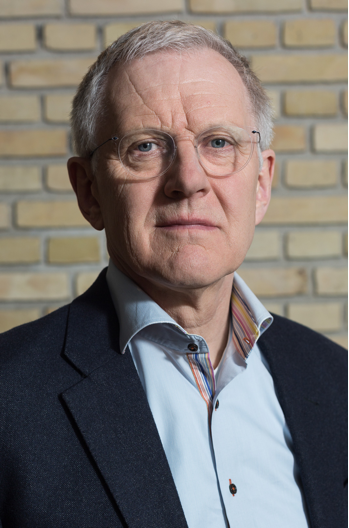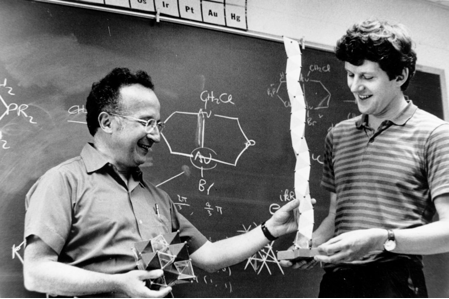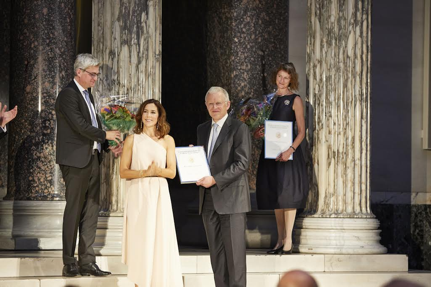Karl Anker Jorgensen, PhD, 1985-86 TTS Scholar at Cornell University

Dr. Karl Anker Jorgensen, Department of Chemistry, University of Aarhus
It’s a safe guess that the thought of interviewing a world-famous organic chemist would seem intimidating to most of us, since such titans of genius don’t cross our paths very often. So when we caught up with Dr. Karl-Anker Jorgensen on a recent visit to New York with his wife Mia, it was a relief – and a delight – to discover he’s very down-to-earth and engaging, brimming with optimism about his ”love affair with chemistry, research and education.” His personal quest is to achieve through basic research what he calls “beautiful” chemical synthesis of new products that have the potential to empower our lives.
In the process of achieving preeminence in the field of organocatalysis (the use of organic molecules that are not metals to accelerate chemical reactions), Dr. Jorgensen has garnered international awards, including the Bjerrum Medal, The Lundbeck Foundation Nordic Research Prize, Cornell University’s Blomquist Award, the Knights Cross 1st Class of the Order of the Dannebrog, and – most recently- Denmark’s prestigious Carlsberg Foundation Research Prize.
We’re proud that TTS scholarships have contributed to the success of Dr. Jorgensen and many other high achievers like him. Following are highlights of our conversation:
You were among the early recipients of a TTS scholarship in 1985. Can you tell us what the scholarship means to you?
The scholarship changed my life completely. On a practical level, it enabled me to pursue post-doctoral studies in the U.S., an experience few Scandinavian scientists were able to have at the time. On a spiritual level, it opened doors to enriching relationships. Richard Netter, co-founder of TTS, became my lifelong friend and generous champion, in every sense my American “father.” And in the process of learning why Richard and Victor Borge established TTS, I looked more closely at my own family and discovered that my grandfather had taken part in the Danish Resistance during WWII, profoundly enhancing my understanding of his life experience.
Please tell us what started your interest in chemistry and why you selected Cornell for your American education.
Following university in Denmark, I took a one-year sabbatical to participate in international competitions of track and field in 110 meter hurtles and decathlon. In 1981, the year I stepped away from sports, Dr. Roald Hoffmann of Cornell received a Nobel Prize for his pioneering work in theoretical chemistry. Once I returned to school and completed studies for a PhD in a combination of organic and theoretical chemistry, it was my dream to further my studies with Dr. Hoffmann. Dr. Hoffmann welcomed my entreaties with a handwritten note that opened the door to a long and fruitful friendship that continues to this day.

With Nobel Laureate Dr. Ronald Hoffmann while a TTS scholar at Cornell University

Danish Crown Princess Mary presenting the Carlsberg Foundation Research Prize to Dr. Jorgensen at an award ceremony in Copenhagen, September 2017
What were the most influential aspects of your study under Dr. Hoffman?
Most significantly, Dr. Hoffmann taught me there is more to chemistry than just the science. The pursuit of discovery is greatly magnified by the ability to be collaborative. Many people have positively impacted my professional and personal journey, so I feel it’s important to give back in the same way. At Aarhus’ Department of Chemistry, my goal is to nurture an enthusiastic environment in which younger researchers can thrive in confidence. Study with Dr. Hoffmann also added to my understanding of the Holocaust. As a young boy, Dr. Hoffmann and his mother survived the Nazi death camps and eventually made their way to America. He recently wrote a play called “Something That Belongs To You,” which communicates the experience of the Holocaust through the eyes of a child.
What do you think is most valuable about international education?
Understanding and respect. My research group at Aarhus attracts bright students from around the world, including young Americans. It’s a joy for me to be able to pay my debt to TTS forward by providing all of them with the best mentoring experience possible so they can excel in effecting impactful change. Some of our recent work has resulted in new treatments for medical conditions such as hypertension and migraine, hopefully bringing relief to many. There can be no greater reward.
In addition to chemistry, what are you most passionate about?
I also have a love affair with art. For me science and art go hand in hand and it’s so important as a scientist to be creative. By devoting time to art, it might help you to look at your scientific challenges in a novel and unprecedented manner.
Interview by Carol Bohdan, September 2017.